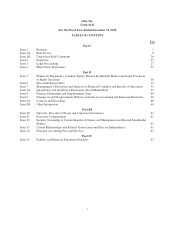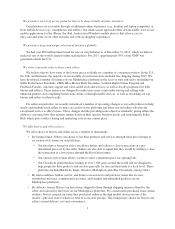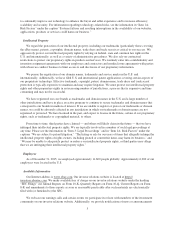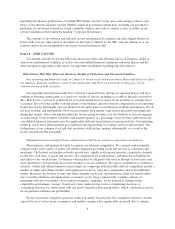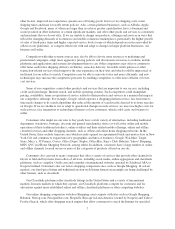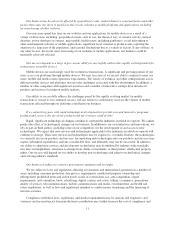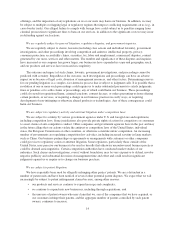eBay 2015 Annual Report Download - page 21
Download and view the complete annual report
Please find page 21 of the 2015 eBay annual report below. You can navigate through the pages in the report by either clicking on the pages listed below, or by using the keyword search tool below to find specific information within the annual report.Global and regional economic conditions could harm our business.
Our operations and performance depend significantly on global and regional economic conditions. Adverse
economic conditions and events (including volatility or distress in the equity and/or debt or credit markets) have
in the past negatively impacted regional and global financial markets and will likely continue to do so from time
to time in the future. Uncertainties relating to the ability of Greece to remain in the European Monetary Union
may adversely impact the economy of the European Union, which is an important market in which we do
business. These events and conditions could have a negative and adverse impact on companies and customers
with which we do business or cause us to write down our assets or investments. In addition, financial turmoil
affecting the banking system or financial markets could cause additional consolidation of the financial services
industry, or significant financial service institution failures, new or incremental tightening in the credit markets,
low liquidity, and extreme volatility in fixed income, credit, currency, and equity markets. Adverse impacts to
the companies and customers with which we do business, the banking system, or financial markets could have a
material adverse effect on our business, including a reduction in the volume and prices of transactions on our
commerce platforms.
We are exposed to fluctuations in foreign currency exchange rates.
Because we generate the majority of our revenues outside the United States but report our financial results
in U.S. dollars, our financial results are impacted by fluctuations in foreign currency exchange rates, or foreign
exchange rates. The results of operations of many of our internationally focused platforms are exposed to foreign
exchange rate fluctuations as the financial results of the applicable subsidiaries are translated from the local
currency into U.S. dollars for financial reporting purposes. If the U.S. dollar weakens against foreign currencies,
the translation of these foreign currency denominated revenues or expenses will result in increased U.S. dollar
denominated revenues and expenses. Similarly, if the U.S. dollar strengthens against foreign currencies,
particularly the Euro, British pound, Korean won or Australian dollar, our translation of foreign currency
denominated revenues or expenses will result in lower U.S. dollar denominated net revenues and expenses. In
addition to this translation effect, a strengthening U.S. dollar will typically adversely affect the volume of goods
being sold by U.S. sellers to Europe and Australia more than it positively affects the volume of goods being sold
by sellers in those geographies to buyers in the United States, thereby further negatively impacting our financial
results.
While from time to time we enter into transactions to hedge portions of our foreign currency translation
exposure, it is impossible to predict or eliminate the effects of this exposure. Fluctuations in foreign exchange
rates could significantly impact our financial results, which may have a significant impact on the trading price of
our common stock and debt securities.
Our international operations are subject to increased risks, which could harm our business.
Our international businesses, especially in the United Kingdom, Germany, Australia and Korea, and cross-
border business from greater China, have generated a majority of our net revenues in recent years. In addition to
uncertainty about our ability to generate revenues from our foreign operations and expand into international
markets, there are risks inherent in doing business internationally, including:
• expenses associated with localizing our products and services and customer data, including offering
customers the ability to transact business in the local currency and adapting our products and services
to local preferences (e.g., payment methods) with which we may have limited or no experience;
• trade barriers and changes in trade regulations;
• difficulties in developing, staffing, and simultaneously managing a large number of varying foreign
operations as a result of distance, language, and cultural differences;
• stringent local labor laws and regulations;
9


